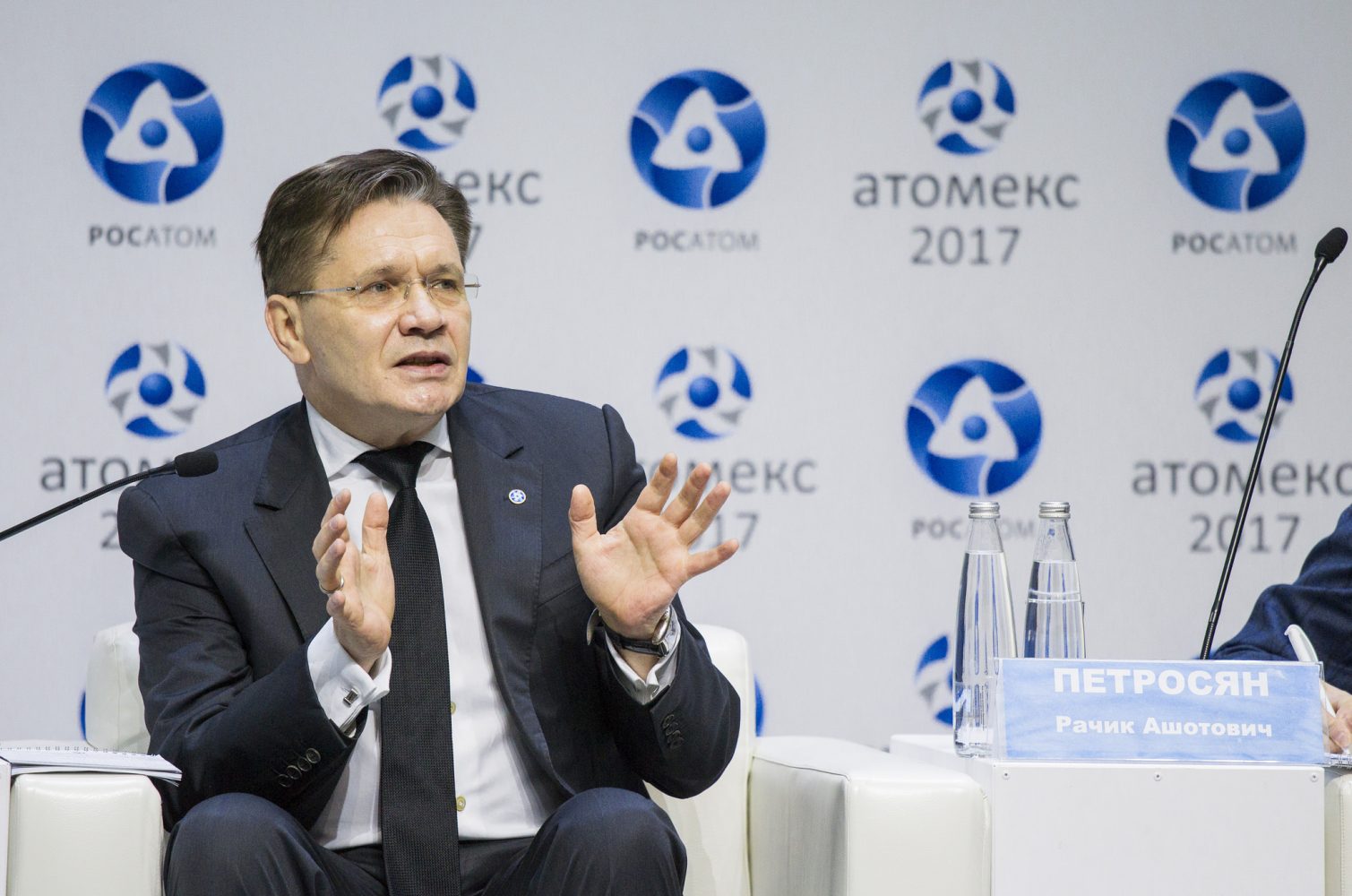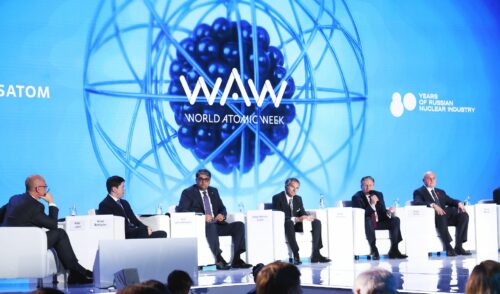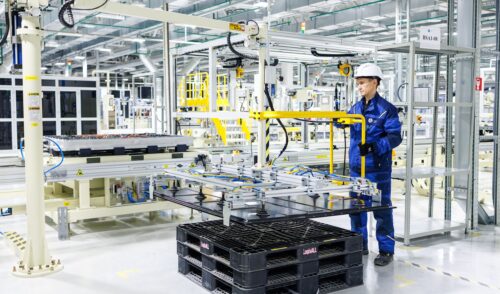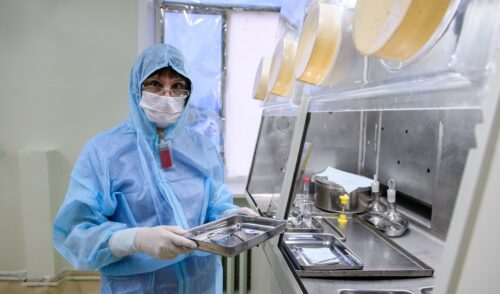
Rosatom Suppliers Make Russia Nuclear Market Leader
back to contentsThe first day of the Forum started with the plenary session entitled ‘Procurement Procedures in Global Hi-Tech Companies: Challenges and Trends’. Speaking at the session, Rosatom’s CEO Alexei Likhachev noted that the Russian nuclear corporation was a notable player on the international nuclear construction market. “This has been achieved, first and foremost, through close cooperation with our suppliers. They are almost 15,000 companies and they all are our teammates and direct contributors to Rosatom’s success,” Likhachev said.
“Today, we have construction contracts for 34 reactors in 12 countries. In addition to that, we are in the process of negotiating construction of approximately the same number of reactors in a comparable number of countries, to say nothing of less powerful facilities, such as nuclear science and technology centers and low-capacity research reactors. Nearly 40 countries are demonstrating strong interest in constructing nuclear facilities with the help of Rosatom,” Likhahev added. Rosatom’s portfolio of international contracts has approached a total of 150 billion US dollars.
More procurement contracts
Speakers at the panel session entitled ‘Rosatom’s Development Trajectory’ mentioned that the amount of procurement orders for Rosatom’s construction sites abroad exceeded the volume of procurement contracts on the domestic market. In 2012, the value of the contracts put out to tender was 313 billion rubles. Three years later, it reached 622.4 billion rubles. According to Roman Zimonas, Director of Procurement Department at Rosatom, the company plans to tender out over 40,000 contracts for products and services for a total of 1.1 trillion rubles by the end of the current year and 2018. This amount will include RUB 604.1bn in international contracts and RUB 504.4bn in national procurements. Out of 1.108 trillion rubles, RUB 741.7bn will be spent on materials, machinery and equipment, with RUB 202.9bn more to be spent on construction and installation. For eight years since the implementation of Rosatom’s procurement system, the company has saved over 190 billion rubles by tendering out procurement contracts. For nine months of 2017 alone, bidding procedures helped save 17 billion rubles.
“Rosatom is facing global challenges that require the company to improve its procurement procedures and know industry trends on the national and international markets. This is what we are to discuss here at the Forum,” Zimonas said.
 Speaking to the suppliers, Kirill Komarov, Rosatom’s First Deputy CEO for International Business, said that their partners learned to follow international standards and acquired necessary expertise by taking part in overseas projects of the Russian nuclear corporation. “But you should understand that the selection process is rigorous. We always have very tight project schedules, and responsibility we bear is great, so we hold you responsible as well.” Kirill Komarov added, “We will make our supplier requirements even more stringent and plan to introduce the practice of pre-contract audits and require suppliers to provide time and quality guarantees. This will be a very demanding regulatory framework.”
Speaking to the suppliers, Kirill Komarov, Rosatom’s First Deputy CEO for International Business, said that their partners learned to follow international standards and acquired necessary expertise by taking part in overseas projects of the Russian nuclear corporation. “But you should understand that the selection process is rigorous. We always have very tight project schedules, and responsibility we bear is great, so we hold you responsible as well.” Kirill Komarov added, “We will make our supplier requirements even more stringent and plan to introduce the practice of pre-contract audits and require suppliers to provide time and quality guarantees. This will be a very demanding regulatory framework.”
He also stressed the fact that Rosatom had commissioned 10 Russian-designed reactor units in Russia and other countries for ten previous years. “No other company in the world can boast the same scale of operations. With such broad expertise in the industry, we are now getting down to re-engineering our procurement and construction management processes. We plan to subcontract larger orders, that is, tender out larger contracts so as to acquire top-class vendors that will be able to deal with the scope of work we want them to do. In return, we want them to provide time and quality guarantees.”
On the second day of the Forum, Russian and foreign suppliers took part in roundtable discussions and workshops. The central event of the day was a roundtable meeting entitled ‘International Nuclear Construction Projects: Cooperation Opportunities’. Its purpose was to present Rosatom’s projects in Bangladesh, Iran and India. Sergei Streltsov, ASE Director for Quality Assurance, told the audience about specific requirements for machinery and equipment, as well as services for nuclear plant construction projects in other countries. He also spoke in detail about requirements set by countries with the developed nuclear industry, such as Hungary or Finland. Dmitri Rudakov, ASE’s Chief Expert and Multi-D Market Project Manager, reported on opportunities offered by the digital platform developed by Rosatom’s engineering division. Multi-D Market is an open platform to select and procure complex equipment and build links between customers and suppliers in Russia and abroad.
EXPERTS SPEAKING
Anton Getta, Deputy of the State Duma, Coordinator of the Fair Procurement Project
Atomex Forum is a perfect example of professional talks in the atmosphere of confidence. Straight talks organized for the ninth time between suppliers and customers are what they need to work out joint solutions on how to amend procurement regulations and federal laws. At the same time, the Forum is a perfect venue to voice discontent over the work of each other. What has always made Rosatom different is dialog between the parties, rather than defense against attacks of others, to jointly develop professional solutions.
Rachik Petrosyan, Deputy Director of the Federal Antimonopoly Service
This Forum has made it clear why so few complaints are filed with the Federal Antimonopoly Service regarding procurements in such a complex, but very transparent nuclear industry. In fact, there is nowhere they might come from because so many professionals discuss all the existing problems and possible solutions before a problem turns into a complaint. The nuclear industry has proved once again that it is at the cutting edge of both technology and management, particularly procurement practices.




